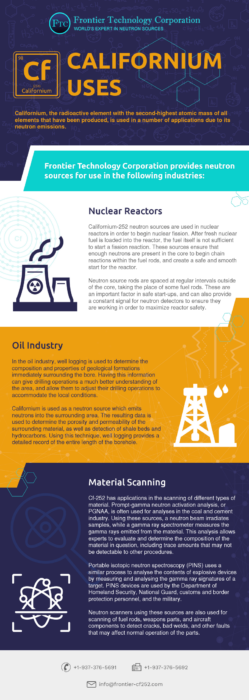Californium, the radioactive element with the second-highest atomic mass of all elements that have been produced, is used in a number of applications due to its neutron emissions.
Frontier Technology Corporation provides neutron sources for use in the following industries:
Nuclear Reactors
Californium-252 neutron sources are used in nuclear reactors in order to begin nuclear fission. After fresh nuclear fuel is loaded into the reactor, the fuel itself is not sufficient to start a fission reaction. These sources ensure that enough neutrons are present in the core to begin chain reactions within the fuel rods, and create a safe and smooth start for the reactor.
Neutron source rods are spaced at regular intervals inside the core, taking the place of some fuel rods. These are an important factor in safe start-ups, and can also provide a constant signal for neutron detectors to ensure they are working in order to maximize reactor safety.
Oil Industry
In the oil industry, well logging is used to determine the composition and properties of geological formations immediately surrounding the bore. Having this information can give drilling operations a much better understanding of the area, and allow them to adjust their drilling operations to accommodate the local conditions.
Californium is used as a neutron source which emits neutrons into the surrounding area. The resulting data is used to determine the porosity and permeability of the surrounding material, as well as detection of shale beds and hydrocarbons. Using this technique, well logging provides a detailed record of the entire length of the borehole.
Material Scanning
Cf-252 has applications in the scanning of different types of material. Prompt-gamma neutron activation analysis, or PGNAA, is often used for analyses in the coal and cement industry. Using these sources, a neutron beam irradiates samples, while a gamma ray spectrometer measures the gamma rays emitted from the material. This analysis allows experts to evaluate and determine the composition of the material in question, including trace amounts that may not be detectable to other procedures.
Portable isotopic neutron spectroscopy (PINS) uses a similar process to analyse the contents of explosive devices by measuring and analysing the gamma ray signatures of a target. PINS devices are used by the Department of Homeland Security, National Guard, customs and border protection personnel, and the military.
Neutron scanners using these sources are also used for scanning of fuel rods, weapons parts, and aircraft components to detect cracks, bad welds, and other faults that may affect normal operation of the parts.



